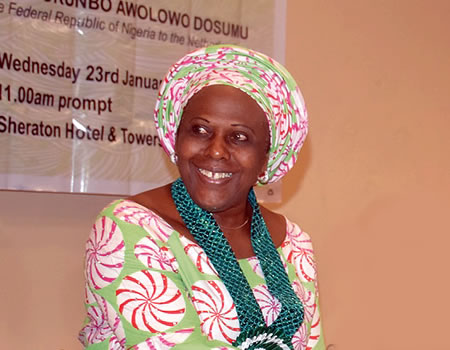Protocols
I consider it a singular honour to have been invited to deliver the 14th edition of the Annual Adekunle Kukoyi Memorial Lecture Series, an event that is held every year to mark the birth anniversary of a man rightly described as ‘a principled man of great integrity and commitment’. He, no doubt, distinguished himself as a member and leader within the surveying profession, both in the public and private sectors.
I only had the opportunity to meet him once or twice, in the course of searching for authentic information about some real estate in Lagos. He had, by then, earned for himself the reputation of being something of an oracle on such matters. I came away from each encounter with the distinct impression of having been in the presence of greatness. There was always something so dignified and assured about his mien and carriage that imparted confidence into whatever information he conveyed. May his great soul continue to rest in peace.
Two suspected Boko Haram insurgents arrested in Damaturu
In accepting to deliver this lecture, I realise that I am following in the footsteps of some of the most illustrious and accomplished personages in Nigeria. You have, also, kindly sent me copies of some of the previous lectures. I am, therefore, well aware of the high standard that has been set for this programme. I salute the leadership of the Nigerian Institution of Surveyors, Lagos State Branch, not only for sustaining the legacy of your leader and mentor, but, more importantly, for remaining faithful to the standard of excellence that he lived for.
Speaking of legacies, the word ‘legacy’ is frequently used to describe the property that people leave their heirs when they die. But every human being also leaves behind a nonmaterial legacy – one that is harder to define but often far more important. This legacy comprises a lifetime of relationships, accomplishments, truths, and values, and it lives on in those whose lives they have touched.
Legacies can be positive or negative. A person who systematically disciplines his life so as to improve the lives of those around him and does his or her best to transform the lives of others in a positive way is bound to leave a positive legacy. These are people who, invariably, have a specific way of life that governs their thinking and their behavior. They systematically attempt to structure their lives in such a way that they become testimonies to whatever world view they proclaim.
Chief Kukyi, no doubt, left a positive legacy. Once again, I thank the Nigerian Institution of Surveyors for keeping the faith and for keeping hope alive.
I referred earlier to the concept of legacy sustenance. I know only too well the challenges that come with attempting to maintain standards in a society that considers such eternal standards and values outdated, and has chosen to embrace ephemeral symbolisms, be they ever so temporary. But, let us remember that, as Dwight D. Eisenhower said, “a people that values its privileges above its principles soon loses both.”The signs of loss are already all too evident as we appear trapped in a never-ending, vicious circle of poor choices and their consequences.
The title of my presentation this morning is ‘Nigeria: Redefining Nationhood’.
What is a Nation?
A ‘nation’ may refer to a community of people who share a common language, culture, ethnicity, descent, or history. In this definition, a nation has no physical borders (for example, some Nigerian ethnic nationalities). However, it can also refer to people who share a common territory and government (for example the inhabitants of a sovereign state) irrespective of their ethnic make-up.
Another definition is, ‘a historically constituted, stable community of people, formed on the basis of a common language, territory, economic life, and psychological make-up manifested in a common culture’.
In the view of Otto Bauer, author of Social Democracy and the Nationalities Question (1907), yet another definition is, ‘… an aggregate of people bound into a community of character by a common destiny.’
First Wave of Redefinition of Nationhood (1914)
If ‘nationhood’ is the state of being a nation, the foregoing definitions suggest that the first redefinition of nationhood took place in Nigeria in 1914 with her unusual ‘birthing’, through the amalgamation of the Northern and Southern Protectorates. The territory thus created did not exactly fit into the definition of a nation because, apart from sharing a common territory and government, the union was neither voluntary nor did her diverse peoples share a common language, culture, history or identity.
Little wonder, then, that some of Nigeria’s founding fathers, and indeed one important representative of the colonial administration, expressed their anxiety about that experiment with nationhood. A few sample quotes will suffice:
On March 31, 1953, when Chief Anthony Enahoro moved the self-government motion, Sir Ahmadu Bello, Sardauna of Sokoto, uttered one sentence – ‘the mistake of 1914 has come to light and I should like to go no further’.
Prior to that, in 1948, Sir Arthur Richards, later Lord Milverton and successor to Sir Bernard Bourdillon as Nigeria’s Governor General from 1943,said: “ it is only the accident of British suzerainty which had made Nigeria one country. It is still far from being one country or one nation socially or even economically… socially and politically there are deep differences between the major tribal groups. They do not speak the same language and they have highly divergent customs and ways of life and they represent different stages of culture.”
Earlier, in 1947, Sir Abubakar Tafawa Balewa, the first and only Prime Minister in the history of Nigeria, was reported to have said, “Since the amalgamation of Southern and Northern provinces in 1914 Nigeria has existed as one country only on paper …. It is still far from being united. Nigeria’s unity is only a British intention for the country.” His statement was recorded in the Hansard of that year.
In the same year, 1947, Chief Obafemi Awolowo, in the chapter, titled, ‘Towards Federal Union’, in his seminal publication, ‘Path to Nigerian Freedom’, also wrote:“Nigeria is not a nation; it is a mere geographical expression. There are no ‘Nigerians’ in the same sense as there are ‘English’ or ‘Welsh’ or ‘French’; the word Nigeria is merely a distinctive appellation to distinguish those who live within the boundaries of Nigeria from those who do not.”
With regard to this statement by Chief Awolowo, Bonaventure Ozoigbo, in his paper, ‘Federal Balancing in Nigeria’, states what every fair-minded person believes, and that is that, ‘in this statement Awolowo was only being frank to the reality at hand, that is, (the) existence of (a) non-federal Nigeria.’
In any case, in his characteristic manner of not only identifying national problems, but also taking the time and trouble to seek viable solutions,Chief Awolowo subsequently devoted a substantial part of his political career to the propagation of federalism as the only viable path to true nationhood for Nigeria.
Permit me to reproduce a few of his thoughts in this regard:
On his preference for federalism, he says:
- ‘In 1951 when the controversy on the form of Nigeria’s constitution began, I had already been for more than eighteen years a convinced federalist.’ (AWO 1960)
And to prove that this was not a position he arrived at without rigorous consideration, he says:
- ‘Our own stand in this matter is well known. We belong to the federalist school. Nevertheless, we have elected to adopt a completely objective and scientific approach to our present search and are prepared to abandon our stand if we see sound reason for doing so. Accordingly, we have made a much more careful study of the constitutional evolution of all nations of the world with a view to discovering whether any, and if so what, principles and laws govern such evolution. We have found that some countries have satisfactorily solved their constitutional problems, whilst others have so far not. In consequence of our analysis of the two sets of countries, we are able to deduce principles or laws which we venture to regard as sound and of universal application… there are altogether six continents in the world… we will take the continents one by one…’ (Thoughts on the Nigerian Constitution 1966);






